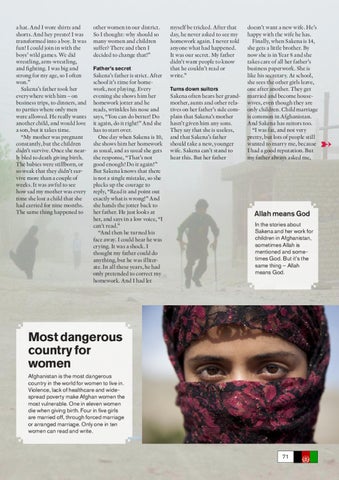a hat. And I wore shirts and shorts. And hey presto! I was transformed into a boy. It was fun! I could join in with the boys’ wild games. We did wrestling, arm-wrestling, and fighting. I was big and strong for my age, so I often won.” Sakena’s father took her everywhere with him – on business trips, to dinners, and to parties where only men were allowed. He really wants another child, and would love a son, but it takes time. “My mother was pregnant constantly, but the children didn’t survive. Once she nearly bled to death giving birth. The babies were stillborn, or so weak that they didn’t survive more than a couple of weeks. It was awful to see how sad my mother was every time she lost a child that she had carried for nine months. The same thing happened to
other women in our district. So I thought: why should so many women and children suffer? There and then I decided to change that!” Father’s secret
Sakena’s father is strict. After school it’s time for homework, not playing. Every evening she shows him her homework jotter and he reads, wrinkles his nose and says, “You can do better! Do it again, do it right!” And she has to start over. One day when Sakena is 10, she shows him her homework as usual, and as usual she gets the response, “That’s not good enough! Do it again!” But Sakena knows that there is not a single mistake, so she plucks up the courage to reply, “Read it and point out exactly what is wrong!” And she hands the jotter back to her father. He just looks at her, and says in a low voice, “I can’t read.” “And then he turned his face away. I could hear he was crying. It was a shock. I thought my father could do anything, but he was illiterate. In all these years, he had only pretended to correct my homework. And I had let
myself be tricked. After that day, he never asked to see my homework again. I never told anyone what had happened. It was our secret. My father didn’t want people to know that he couldn’t read or write.” Turns down suitors
Sakena often hears her grandmother, aunts and other relatives on her father’s side complain that Sakena’s mother hasn’t given him any sons. They say that she is useless, and that Sakena’s father should take a new, younger wife. Sakena can’t stand to hear this. But her father
doesn’t want a new wife. He’s happy with the wife he has. Finally, when Sakena is 14, she gets a little brother. By now she is in Year 8 and she takes care of all her father’s business paperwork. She is like his secretary. At school, she sees the other girls leave, one after another. They get married and become housewives, even though they are only children. Child marriage is common in Afghanistan. And Sakena has suitors too. “I was fat, and not very pretty, but lots of people still wanted to marry me, because I had a good reputation. But my father always asked me,
Allah means God In the stories about Sakena and her work for children in Afghanistan, sometimes Allah is mentioned and sometimes God. But it’s the same thing – Allah means God.
Most dangerous country for women Afghanistan is the most dangerous country in the world for women to live in. Violence, lack of healthcare and widespread poverty make Afghan women the most vulnerable. One in eleven women die when giving birth. Four in five girls are married off, through forced marriage or arranged marriage. Only one in ten women can read and write.
71
